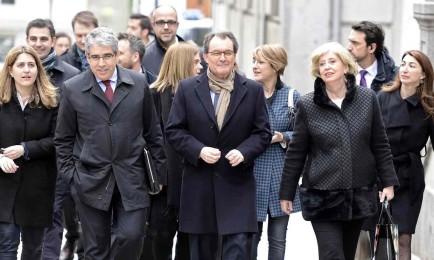
Artur Mas, centre, after receiving his sentence at the Catalan High Court. Photo: Getty Images/AFP
Artur Mas, the former president of Catalonia and permanent thorn in Madrid’s side, has been slapped with a €36,500 fine and been barred from holding public office for two years following the staging of Catalonia’s symbolic independence referendum in 2014…
The Catalan high court found Mas guilty of disobeying the Spanish Constitutional Court in pressing ahead with the referendum in November 2014. Although solely symbolic, Mas has been accused of deliberately defying the Spanish authorities despite the vote garnering lots of public support and causing little-to-no civil unrest.
The result of the referendum showed that the majority (80%) of Catalans would be in favour of independence – a desire repeatedly quashed by the Spanish government, which has said it will not countenance the idea of Catalonia breaking away.
The conviction of Mas, however, is likely to cause controversy in Catalonia. The politician ran the Autonomous Community between 2010 and 2016, and was a vocal proponent for secession. Speaking at his trial last month, Mas said that “there was no intent to commit any crime or disobey anyone. Our aim was to rise to the challenge and promote participation by all means possible.”
Mas also raised the point that very little was done by the Spanish authorities to prevent the referendum, hinting that if it would have always been considered a crime then the national government simply would not have allowed it to happen.
“Why didn’t the Constitutional Court do anything to stop the vote?” Mas asked. “It is the first time that a democratic government is being tried for having allowed people to vote, it’s an unprecedented moment.”
The Constitutional Court of Spain did rule the vote illegal five days before it was held on November 9 2014. Nevertheless, no concrete plans or actions were put in place to halt proceedings, and more than 40,000 volunteers lent their assistance as the polls opened, drawing 2.3 million Catalans to various schools and polling stations.
Relations between Madrid and Barcelona have become fraught once more in recent months, with the current Catalan government poised to hold another referendum on independence later this year. These manoeuvres have already been blocked by the Spanish courts, with current head of the Catalan government Carles Puigdemont already warned that he too could face legal action if another non-binding vote goes ahead.
However, rather than be cowed by Mas’ fine and suspension, Puigdemont tweeted his support for his predecessor, writing: “All my support to Mas… in the wake of this unjust sentence. Democracy should be exercised, not banned.”
Madrid’s view is that such referendums do not represent democracy, rather the crowing of one corner of the country that does not have the constitutional powers to call or hold such votes. Indeed, there have been rumours that Madrid may move to invoke article 155 of the Spanish Constitution, which would enable central government to take drastic steps to prevent any referendum, in Catalonia from taking place, such as ordering the closure of schools on the day of the polling, and even providing instructions to the Catalan police force.
 en
en



 Vlaams-Nederlands
Vlaams-Nederlands
0 Comments
Leave a Comment
DISCLAIMER
The opinions and comments expressed by contributors to this Blog are theirs alone and do not necessarily reflect the views of VIVA Homes Under the Sun Ltd, any of its associated companies, or employees; nor is VIVA to be held responsible or accountable for the accuracy of any of the information supplied.
Have you got something to say?